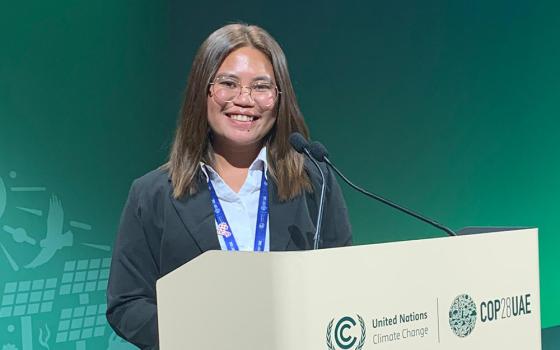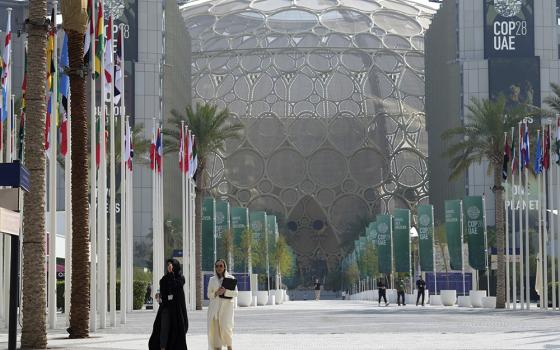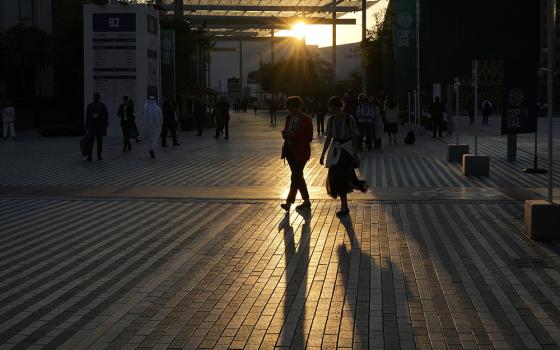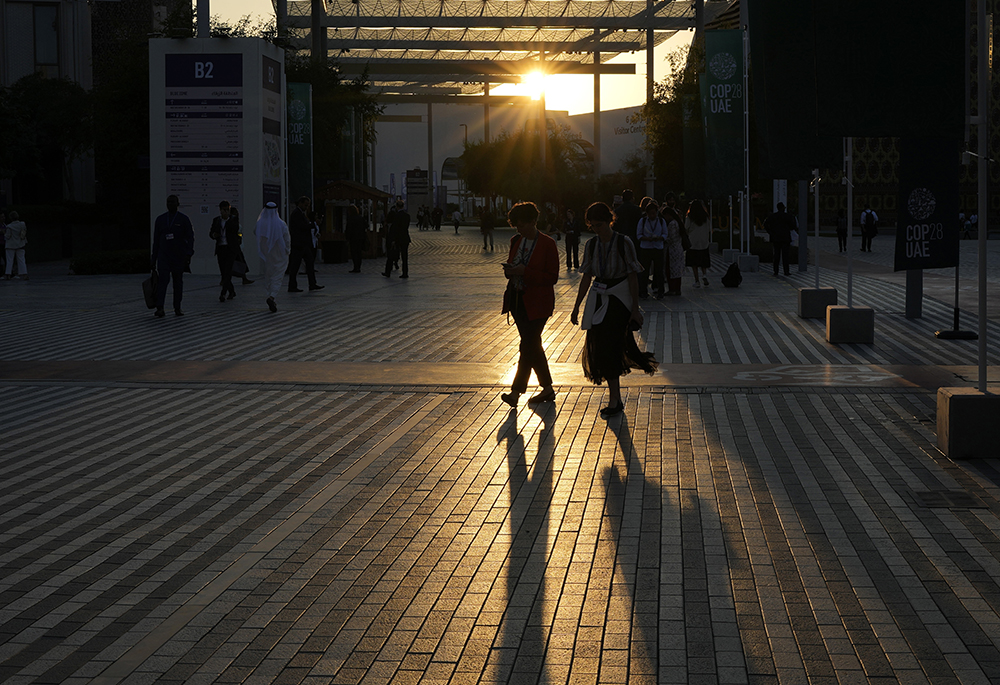
People walk through the COP28 U.N. climate summit, Tuesday, Dec. 5, in Dubai, United Arab Emirates. Catholic institutions wrote in a letter issued Dec. 5 to the president of the COP28 climate change summit that nations meeting in Dubai should adopt a new treaty charting the end of fossil fuel use. (AP photo/Rafiq Maqbool)
Nations meeting in Dubai should adopt a new treaty charting the end of fossil fuel use, a group of Catholic institutions wrote in a letter to the president of the COP28 climate change summit.
The Catholic letter, issued Dec. 5, lays out seven key priorities for the nearly 200 countries assembled in Dubai, United Arab Emirates, for the annual United Nations climate conference, where talks are taking place around the global response to climate change under the 2015 Paris Agreement. The letter is addressed to COP28 president Sultan al-Jaber, who in that role is leading the proceedings.
It was issued by 14 Catholic organizations: the Laudato Si' Movement; Caritas Internationalis, along with national Caritas chapters for the U.S. (Catholic Relief Services), England and Wales (CAFOD), Scotland (SCIAF) and Germany (Misereor); religious order groups at the U.N. UNANIMA International, Vivat International and Carmelite NGO; Medical Mission Sisters; International Young Catholic Students; International Movement of Catholic Students; Catholic Youth Network for Environmental Sustainability in Africa; and Boston College. In addition, the letter has been signed by more than 14,600 people, as of Dec. 6.
Chief among the Catholic groups' priorities is the progressive elimination of fossil fuels. They cite the recent U.N. Intergovernmental Panel on Climate Change report that restated carbon emissions must be nearly halved by 2030, and approach net zero by 2050 to limit global warming to 1.5 degrees Celsius — the more ambitious temperature goal that nations agreed to under the Paris accord, and a level scientists say would prevent millions of people from facing more devastating heat waves, droughts, wildfires and extreme storms.
Global emissions are on track to hit a record high this year, and fossil fuel production continues to expand, while the past 12 months have been the hottest on record. The "global stocktake" progress report at the center of COP28 has shown nations well off pace in meeting the 1.5 C limit, with warming set to nearly double that level by the end of the century under climate policies currently in place.
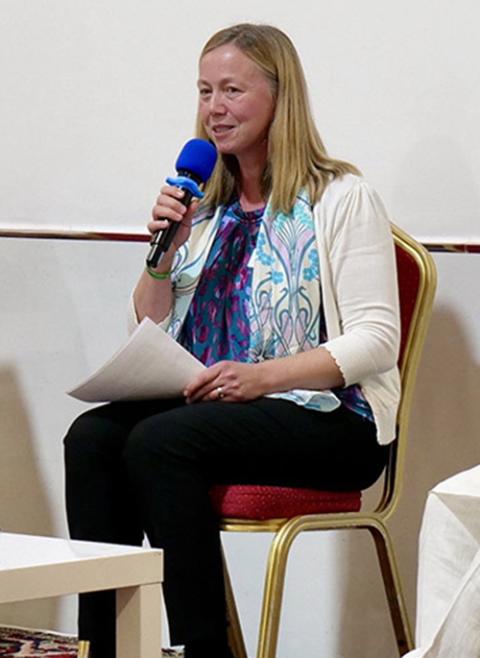
Lorna Gold, board president of the Laudato Si' Movement and executive director of FaithInvest, pictured Nov. 7, 2021, in Glasgow, Scotland, during the COP26 U.N. climate change conference. (Courtesy of FaithInvest)
Burning coal, oil and gas releases heat-trapping greenhouse gas emissions, which are primarily driving climate change. While the Paris Agreement spells out emissions reduction targets, it does not stipulate how countries achieve them nor does it mention fossil fuels.
Trying to address climate change without talking about fossil fuels is akin to trying to change a lightbulb without removing the bulb, said Lorna Gold, board president of Laudato Si' Movement and executive director of FaithInvest, during an official COP28 side event where the letter was presented.
"It feels sometimes at COPs that we're … going around the place talking about everything apart from the one thing we need to be doing," she said.
Two years ago, at COP26 in Glasgow, nations for the first time stated the need to "phase down" the use of "unabated coal power." A focal point at COP28 — which has attracted a record number of fossil fuel lobbyists — is whether nations will include in the final text a commitment to halt the use of fossil fuels. A working draft issued Dec. 5 laid out options of "an orderly and just phase out of fossil fuels" or "accelerating efforts towards phasing out unabated fossil fuels" or no mention at all.
More than 100 countries have unified behind a phaseout of unabated fossil fuels, which refers to emissions that cannot be captured and stored, while oil-and-gas producing countries have resisted the "phaseout" phrasing.
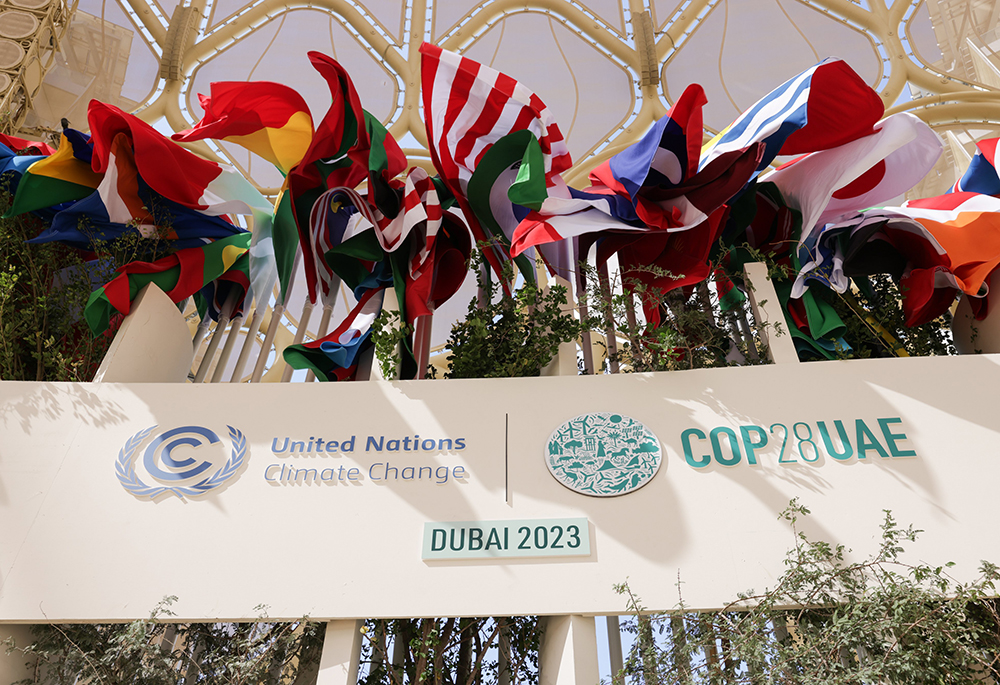
Flags can be see inside the dome during COP28, the U.N. climate change conference, at Expo City Dubai Nov. 30 in Dubai, United Arab Emirates. (CNS/Courtesy of U.N. Climate Change COP28/Christophe Viseux)
Al-Jaber himself has come under fire for comments before COP28 questioning the scientific basis for a need to phase out fossil fuel use. The IPCC report, along with numerous other scientific reports, have spelled out the connection between emissions from burning fossil fuels and rising global temperatures, with nearly 90% of carbon emissions in the atmosphere from coal, oil and gas.
"One thing is clear: To have a decent chance of holding to the 1.5 °C limit, fossil fuel extraction must begin to decline immediately, phase down rapidly in the coming decades, and cease worldwide by 2050," the Catholic letter stated.
For countries to do that, the Catholic groups say a new pact is needed due to the Paris Agreement's omission of fossil fuels, and they called on governments to adopt a parallel Fossil Fuel Non-Proliferation Treaty.
A growing number of Catholic and other faith groups have rallied behind the grassroots-led fossil fuel treaty since its introduction in 2020 during the COVID-19 pandemic. It has garnered support from nearly 100 cities and thousands of civil society groups. Eleven countries have endorsed the treaty proposal so far, including Colombia and Samoa at COP28. Tzeporah Berman, chair of the treaty initiative, was among the speakers at the Catholic letter event.
While the Holy See, now an official party to the Paris Agreement, has not taken a stance on the proposed treaty, individual Vatican officials have voiced support.
Advertisement
In a recorded message at the COP28 event, Archbishop Lizardo Estrada Herrera, secretary general of CELAM, the Latin American bishops' council, said the Paris accord "must be complemented by a binding treaty to 'end the fossil fuel era,' " referring to Pope Francis' call in his 2023 World Day of Prayer for the Care of Creation message.
In his 2015 encyclical "Laudato Si', on Care for Our Common Home," Francis stated "the use of highly polluting fossil fuels — especially coal, but also oil and, to a lesser degree, gas — needs to be progressively replaced without delay." In his recent apostolic exhortation Laudate Deum he bemoaned that eight years later "the necessary transition towards clean energy sources such as wind and solar energy, and the abandonment of fossil fuels, is not progressing at the necessary speed."
Francis in his message to the Dubai climate summit, read by Cardinal Pietro Parolin, stated that for COP28 to be a successful "turning point" will require countries to agree to binding and monitored commitments that include eliminating fossil fuels as part of an accelerated transition to renewable energy sources.
The Catholic letter joined in calling for countries to triple global renewable energy capacity by 2030. At COP28, more than 120 countries backed that goal, along with doubling energy efficiency.
Other asks by the Catholic institutions include:
- "Clear, actionable, and specific paths" from the global stocktake process to put countries back on track to meeting the Paris goals, in ways that respect human rights and Indigenous people;
- Comprehensive operationalization of the loss and damage fund for countries hit hardest already by climate impacts, like more extreme heatwaves, droughts and storms;
- Policies that take into account and address "entrenched structural causes" driving climate change in the economy and society;
- Recognition of the need for cultural changes, including in personal lifestyles, beyond technological fixes.
"As leaders, your decisions will determine the fate of our common home and the common good of present and future generations," the letter stated.
During the COP28 event, Catholic speakers highlighted the ways climate change has adversely impacted women and vulnerable places like island states, and noted steps Catholics can take through education, investments and their purchasing.
Fr. Jean Rajoelison, deputy secretary general of the Symposium of Episcopal Conferences of Africa and Madagascar, said the Catholic community asks leaders at COP28 "to recognize their moral duty and commit to urgently taking ambitious action to protect our common home and the most vulnerable."





